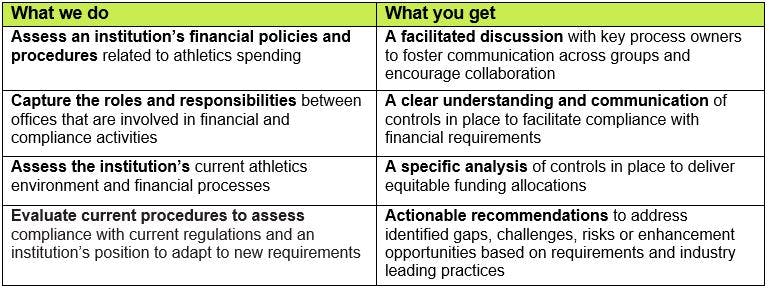

Knight Commission C.A.R.E. Model recommendations could impact NCAA funding distribution and governance
In November 2021, the Knight Commission on Intercollegiate Athletics (Knight Commission), a panel of university presidents, former athletic directors and other leaders, updated a report recommending its Connecting Athletics Revenue with the Educational Model of College Sports (C.A.R.E. Model), a new approach for the distribution of National Association of Collegiate Athletics (NCAA) funds to Division I institutions.
Each year, more than $3.5 billion in revenue is distributed to Division I institutions. Of the annual distribution:
- More than $2.6 billion from networks, media contracts and championships is distributed to all 351 Division I colleges and universities with roughly $2 billion allocated to the Power 5 institutions
- Roughly $600 million from the NCAA men’s basketball championship (i.e., March Madness) is distributed to all Division I institutions
- Nearly $500 million from the College Football Playoff (CFP) is distributed to the 130 Football Bowl Subdivision (FBS) institutions
The report argues that the existing system allows for, and will continue to allow for, disproportionate spending on coaches’ compensation and state-of-the-art athletic facilities relative to educational, health and safety priorities.
Knight Commission recommendations summary
In its report, the Knight Commission outlines the five core principles of its C.A.R.E. Model:
- Transparency – requires public disclosure of the distributed revenue allocations and uses as well as the gender and ethnicity demographics of athletic programs (i.e., student athletes and staff)
- Independent oversight – requires an independent entity (i.e., not employed by the NCAA, CFP, member institutions or their corporate or media partners) to approve revenue distribution plans for compliance with the C.A.R.E. principles. Furthermore, the model requires a board comprised of at least one-third of current and former college athletes lead the independent entity
- Gender equity – requires distribution policies to be equitable in terms of gender
- Broad-based sports opportunities – requires nationally-generated revenue to benefit all sports and athletes universally and avoid a disproportionate distributions to revenue-generating sports
- Financial responsibility – requires a system to measure how spending supports the following:
- Athlete education, health and wellbeing
- University academic programs
- Athletic programs that provide broad-based opportunities and achieve racial and gender equity
This principle also recommends meaningful incentives and penalties to encourage spending consistent with the broad educational mission for college sports and minimum financial thresholds to limit sport-specific spending.
What can we expect next?
The Knight Commission’s C.A.R.E. Model was presented to the NCAA’s Constitution Committee, a recently-appointed group tasked with proposing a new governance model. While the committee considers dramatic changes to the NCAA’s constitution, it may adopt some or all of the Knight Commission’s recommended principles as it revises the draft constitution. A new constitution will be voted on at the 2022 NCAA Convention in January 2022.
Constitutional changes, if adopted, will alter the structure of the NCAA and how it operates and governs intercollegiate athletics. The Knight Commission’s C.A.R.E Model proposes changes that would need to be implemented broadly but also at the institutional level (e.g., public disclosure requirements, to changes financial reporting).
Key considerations for higher education institutions
- How will your institution be financially affected if the NCAA adopts the C.A.R.E Model?
- How can you position your institution to maximize your allocation?
- How will allocated dollars be used to align with the five core C.A.R.E. Model principles?
- What compliance requirements are needed to justify your allocation?
- What additional training will key stakeholders need regarding the new model?
Baker Tilly can help
We can help your institution take a proactive approach to evaluate the current state of your financial policies, processes and internal controls related to athletics to identify opportunities that align with potential funding distribution and allocation changes.
Contact our higher education specialists to learn more about how we can help your institution.


